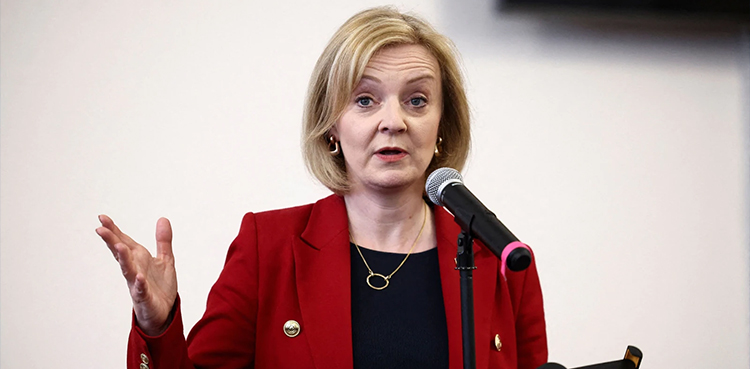Prime Minister Liz Truss apologised for threatening Britain’s economic stability after she was forced to scrap her vast tax-cutting plans and embark on a programme of “eye-watering” public spending cuts instead.
After weeks of blaming the markets and “global headwinds” for investors dumping the pound and government bonds, Truss said she was sorry for going “too far and too fast” with her radical economic plan to snap Britain out of years of stagnant growth.
Markets, plunged into turmoil after her Sept. 23 “mini-budget”, are still under strain even after Truss’s finance minister Jeremy Hunt tore up her plans on Monday.
It was also not clear whether Truss’s apology would quell a growing rebellion in her governing Conservative Party, with a handful of lawmakers calling for her to quit, while dozens of others are fearing they will lose their jobs in a new election.
Even one of her ministers said she could not afford to make any more mistakes – something that could be difficult when her government looks for deep savings. Already Hunt has refused to guarantee the budgets of departments like health and defence.
Truss’s decision to pull her economic programme has so far eased some of the pressure on Britain’s elevated borrowing costs, but the scale of the reversal means she is now fighting to survive, just six weeks after she became prime minister.
The withdrawal of a two-year energy support scheme plus possible changes to pension and welfare benefit levels means the country’s looming recession is expected to deepen, as households struggle with surging energy and food costs.
“I do want to accept responsibility and say sorry for the mistakes that have been made,” Truss told the BBC late on Monday.
“I wanted to act to help people with their energy bills, to deal with the issue of high taxes, but we went too far and too fast.” She added she was “sticking around” and that she would lead the Conservatives into the next election due in about two years time, although the statement was accompanied by a laugh.
Truss watched silently in parliament on Monday as Hunt demolished the radical economic agenda she proposed less than a month ago, and which triggered a bond market rout so deep that the Bank of England had to intervene to prevent pension funds from collapsing.
For some in the party, the sight of a prime minister humbled in parliament did little to offer any confidence she could fight on.
The Daily Mail, which had hailed Truss’s plan, ran a front page with the prime minister leaving parliament on Monday underneath the headline “In office, but not in power” while the also supportive Sun newspaper called her “The Ghost PM”.
James Heappey, a minister for the armed forces, said Truss, his boss, could not afford to make any more mistakes. “To her credit, she has owned it and apologised,” he told Sky News.
She meets her cabinet team of top ministers on Tuesday and then will speak to her lawmakers, who have been urged by some close to government to hold off from any move to oust her until Oct. 31 when the government presents its full fiscal plan.
MARKET TURMOIL
Truss was elected by party members and not the broader electorate on a promise to slash taxes and regulation to fire up the economy in a policy that was dubbed by critics as a return to 1980s Thatcherite-style “trickle-down” economics.
But the market reaction was so dramatic that borrowing costs surged, lenders pulled mortgage offers and pension funds fell into a tailspin.
The Bank of England said a report in the Financial Times about a new delay to the start of its sales of government bonds was inaccurate. The FT said it had learned that top officials were likely to decide a delay was needed after judging the gilts market to be “very distressed” in recent weeks.
Ryanair boss Michael O’Leary described Britain’s economic situation as a “car crash” which he blamed on the country’s decision to vote to leave the European Union in 2016.
With Britain’s economic reputation shattered, Hunt may now have to go further in finding public spending cuts than the government would have done had Truss not unleashed her economic plan at a time of surging inflation.
Torsten Bell, the head of the Resolution Foundation, a think tank, told BBC radio that the government may now need to find public spending cuts of around 30 billion pounds, a task that will be made more difficult by successive Conservative governments cutting departmental budgets over the last 10 years.
One area of spending already to go is Truss’s vast two-year energy support package that was expected to cost well over 100 billion pounds ($113.5 billion).
Hunt has said support to households and businesses will now last until April, before it is reviewed, prompting analysts to say families could face energy bills of 5,000 pounds next year.
On Monday, Hunt refused to guarantee previous policies, such as a commitment to increase pensions in line with inflation.
Showing the pressures that will grow on the government as it tries to cut spending, Heappey, a junior minister, said he would quit if the government dropped its plan to increase defence spending to 3% of GDP by 2030. “There is no prosperity without security,” he told LBC Radio.
Truss also faces a struggle to win back not only her own lawmakers, but also a public, who according to YouGov, ranks her as the most unpopular leader the company has ever tracked.
($1 = 0.8807 pounds)
from International News Today - Breaking News, US News, World News https://ift.tt/quEfGiO
via IFTTT
